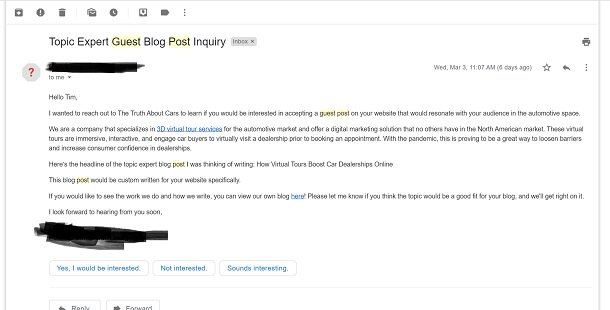Beware the Secret Guest Post

Every day my inbox fills with scammy, scummy come-ons from folks who are trying to sell TTAC on allowing them to guest post.
They usually work like this – the “person” (emails could be coming from someone operating under a pseudonym, or even a bot) behind the email is either offering to pay us to run a guest post, written by them, that would create a bunch of links back to whatever product they’re hawking.
The Outline (RIP) covered this in general terms a few years ago, and I read one of the posts not long after I started at TTAC, sitting in a greasy-spoon diner near our corporate parent’s HQ in Toronto, as I ate breakfast and killed time before flying home. I thought it was an interesting look into a seedy part of the media industry, but I didn’t give it much thought beyond that.
That’s because while The Outline’s investigation showed that some of this scammy stuff was breaking into well-read/well-known names like Forbes, there was no evidence that a mainstream national publication of even higher import (the New York Times, say, or the Wall Street Journal) had allowed any of these articles – it should go without saying that these would violate journalist ethics – to be published. Nor was I aware of any issues in automotive journalism.
Then, soon after, I noticed my inbox was being flooded by come-ons for this sort of scheme. This was one of those things where I’d noticed the behavior before, but it became more obvious after I started really paying attention, instead of just sending emails to the virtual trash bin.
There is a reason why this scam seemed to pop up at certain sites but hasn’t yet, to my knowledge, gotten its tentacles into the larger world of journalism. It’s that Forbes and Huffington Post, perhaps the two biggest-name outlets called out by The Outline, are (or at least were) sites that paid writers relatively little and, to my knowledge, provided little or no editorial oversight.
It should go without saying, but most mainstream media outlets would have a level of editorial oversight that should keep any of this kind of slimy content from slipping through, no matter how well or poorly a freelance contributor is paid. That said, it’s always possible that a harried editor misses a subtle mention of a paid client. Similarly, an editor might trust a contributor’s ethics and not sense something is amiss.
Note: What is at issue here is different from the clearly-marked sponsored content we sometimes run. That includes the controversial Lexus sponsored piece, which was marked as such, though perhaps not as clearly as it should’ve been.
TTAC has a reputation for calling out unethical journalism, at least in the automotive space, and our mission to do so hasn’t changed on my watch. That said, we haven’t done much of it since Jack fisked Electrek before moving on. It’s not out of fear of upsetting folks or protection of personal relationships – we simply haven’t been made aware of any specific issues in recent years.
To be very clear, I have not heard of any OEM doing this with car reviews or news. Most of the pitches in my inbox seem generic, and the few that are actually related to automotive seem to come from small marketing companies or auto-parts retailers that no one has ever heard of.
I bring this up now because it seems like more and more of these scammy emails have been hitting my inbox over the last year. I can’t delete them fast enough, and some of them have even looked, at first glance, like legitimate pitches from young journalists trying to break into the industry.
Consider this a public service announcement: There’s a slim chance that something you’re reading that appears to be objective journalism isn’t, and it would be difficult, if not impossible for you to prove. The good news is any outlet with regular editorial oversight would likely nip this sort of thing in the bud.
The best way for you, the media consumer, to sniff out this sort of work is to dig around on the site, maybe check out its “about us” page or its editorial standards/guidelines, should it publish them publicly. You should be able to get a sense of whether or not a site is allowing freelance work to be published with little or no oversight. If it is, be wary.
And if you see a piece elsewhere in the automotive sphere that seems to be praising some auto-parts company or dealer-management software suspiciously, you know how to reach us.
[Image: TTAC screenshot from my inbox]

Tim Healey grew up around the auto-parts business and has always had a love for cars — his parents joke his first word was “‘Vette”. Despite this, he wanted to pursue a career in sports writing but he ended up falling semi-accidentally into the automotive-journalism industry, first at Consumer Guide Automotive and later at Web2Carz.com. He also worked as an industry analyst at Mintel Group and freelanced for About.com, CarFax, Vehix.com, High Gear Media, Torque News, FutureCar.com, Cars.com, among others, and of course Vertical Scope sites such as AutoGuide.com, Off-Road.com, and HybridCars.com. He’s an urbanite and as such, doesn’t need a daily driver, but if he had one, it would be compact, sporty, and have a manual transmission.
More by Tim Healey
Latest Car Reviews
Read moreLatest Product Reviews
Read moreRecent Comments
- 1995 SC If the necessary number of employees vote to unionize then yes, they should be unionized. That's how it works.
- Sobhuza Trooper That Dave Thomas fella sounds like the kind of twit who is oh-so-quick to tell us how easy and fun the bus is for any and all of your personal transportation needs. The time to get to and from the bus stop is never a concern. The time waiting for the bus is never a concern. The time waiting for a connection (if there is one) is never a concern. The weather is never a concern. Whatever you might be carrying or intend to purchase is never a concern. Nope, Boo Cars! Yeah Buses! Buses rule!Needless to say, these twits don't actual take the damn bus.
- MaintenanceCosts Nobody here seems to acknowledge that there are multiple use cases for cars.Some people spend all their time driving all over the country and need every mile and minute of time savings. ICE cars are better for them right now.Some people only drive locally and fly when they travel. For them, there's probably a range number that works, and they don't really need more. For the uses for which we use our EV, that would be around 150 miles. The other thing about a low range requirement is it can make 120V charging viable. If you don't drive more than an average of about 40 miles/day, you can probably get enough electrons through a wall outlet. We spent over two years charging our Bolt only through 120V, while our house was getting rebuilt, and never had an issue.Those are extremes. There are all sorts of use cases in between, which probably represent the majority of drivers. For some users, what's needed is more range. But I think for most users, what's needed is better charging. Retrofit apartment garages like Tim's with 240V outlets at every spot. Install more L3 chargers in supermarket parking lots and alongside gas stations. Make chargers that work like Tesla Superchargers as ubiquitous as gas stations, and EV charging will not be an issue for most users.
- MaintenanceCosts I don't have an opinion on whether any one plant unionizing is the right answer, but the employees sure need to have the right to organize. Unions or the credible threat of unionization are the only thing, history has proven, that can keep employers honest. Without it, we've seen over and over, the employers have complete power over the workers and feel free to exploit the workers however they see fit. (And don't tell me "oh, the workers can just leave" - in an oligopolistic industry, working conditions quickly converge, and there's not another employer right around the corner.)
- Kjhkjlhkjhkljh kljhjkhjklhkjh [h3]Wake me up when it is a 1989 635Csi with a M88/3[/h3]































Comments
Join the conversation
So you're saying you won't just whore yourself out to just ANY body?
Why is a post or content marked as sponsored post?